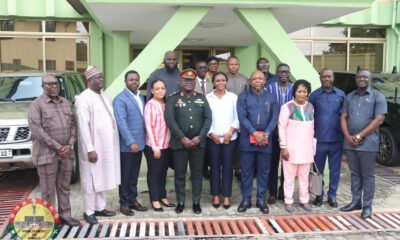News
Maternal mortality rate increases in Ashanti Region

The Ghana Health Service has revealed a staggering statistic of 1,000 women losing their lives during childbirth in the Ashanti Region between 2020 and 2024.
This alarming number, according to the Regional Health Director, Dr Frank Adomanko Boateng, highlights the persistent challenge of maternal mortality in Ghana, despite efforts to improve maternal healthcare.
Dr Adomanko Boateng, therefore emphasized on an urgent need for stronger interventions to curb the high rate of maternal deaths.
Speaking at the 2024 Regional Health Forum, he indicated that “Ghana is struggling to meet the Sustainable Development Goal (SDG) target of reducing maternal mortality to 70 deaths per 100,000 live births by 2030.”
Dr Boateng stressed that time was of the essence, saying, “The clock is ticking, and we must double our efforts.”
He called for intensified measures over the next six years to bridge the gap and prevent further loss of lives.
Ghana’s maternal mortality ratio, he noted, has been declining from 760 deaths per 100,000 live births in 1990 to 310 deaths per 100,000 live births in 2017.
However, “the country still faces significant challenges in reducing maternal mortality, particularly in regions like Ashanti.”
To address the issue, he said, Ghana has been working to improve maternal healthcare through various initiatives, including the Network for Improving Quality of Care for Maternal, Newborn and Child Health.
The country aims to reduce maternal mortality by strengthening healthcare systems, improving access to quality care, and enhancing community engagement
From Kingsley E. Hope,
Kumasi
Hot!
Speaker of Parliament inaugurates open Parliament Steering Committee, launches action plan

The Speaker of Parliament, Alban Sumana Kingsford Bagbin, has launched the Open Parliament Steering Committee and the Open Parliament Action Plan.
The ceremony was under the theme “Achieving Gender Equality: Action by Action.”
The Speaker highlighted the critical role Parliament plays in translating the will of the people into inclusive legislation, responsive policies, and accountable governance.
“The International Day of Parliamentarianism is worth celebrating, as it offers an opportunity not only to recognise and promote achievements in strengthening democratic governance, but also to pause and reflect on the remaining gaps in institutionalising parliamentary democracy,” he said.
He noted that the event was scheduled to coincide with the International Day of Parliamentarianism to reinforce the importance of open and inclusive governance.
The Majority Leader, Mahama Ayariga, stated that the International Day of Parliamentarianism is intended to recognise the vital role Parliaments play globally as pillars of democratic governance.
He noted that this marks the first time Ghana is formally observing the day.
“The gravity of our observance is further accentuated as we convene to witness the launch of the Open Parliament Action Plan by the Open Government Partnership Caucus,” he said.
Delivering a statement on behalf of the Minority Leader, Alexander Kwamena Afenyo-Markin, the Deputy Minority Leader, Patricia Appiagyei, described the Open Parliament Action Plan as a transformative initiative aimed at strengthening the relationship between Parliament and the public.
She said the plan represents a bold commitment to making Parliament more transparent, accessible, and responsive to the needs of Ghanaians.
The Clerk to Parliament, Mr. Ebenezer Ahumah Djietror, described the launch as a key milestone in the effort to build a citizen-focused and accountable Parliament.
He added that the International Day of Parliamentarianism is a call to action to recommit to the highest standards of public service and democratic accountability.
The inauguration was attended by a wide range of stakeholders, including the Majority and Minority Members of Parliament, members of the Open Parliament Steering Committee, the Open Government Partnership (OGP) Caucus, Parliamentary Network Africa, representatives from civil society organisations, members of the diplomatic corps, traditional and religious leaders, student bodies, the Parliamentary Press Corps, and other media partners.
Hot!
NACOC declares drug menace a national emergency

The Parliamentary Committee on Defence and Interior has paid a working visit to the Narcotics Control Commission (NACOC) to engage with its leadership and assess operational challenges hampering the fight against illicit drugs.
In a detailed presentation, Dr. Basha Ligbi, Head of the Commission’s Research Bureau, highlighted critical setbacks including broken body scanners at airport terminals, inadequate office infrastructure, overcrowded detention facilities, and deteriorating vehicles.
He also called for the Commission’s headquarters to be reclassified as a security zone, citing growing security risks due to private encroachment and nearby high-rise developments.
Director General of NACOC, Brigadier General Maxwell Obiba Mantey, described the escalating drug trade as a national emergency, warning that drug barons now rival armed robbers in threat level and are gaining influence at the highest levels.
He appealed for stronger institutional support and morale-boosting interventions to preserve the integrity of NACOC officers.
Chairman of the Committee and MP for Builsa North, James Agalga, assured the Commission of the Committee’s commitment to escalate the concerns to Parliament and engage key justice sector stakeholders to fast-track reforms in support of NACOC’s mandate.














